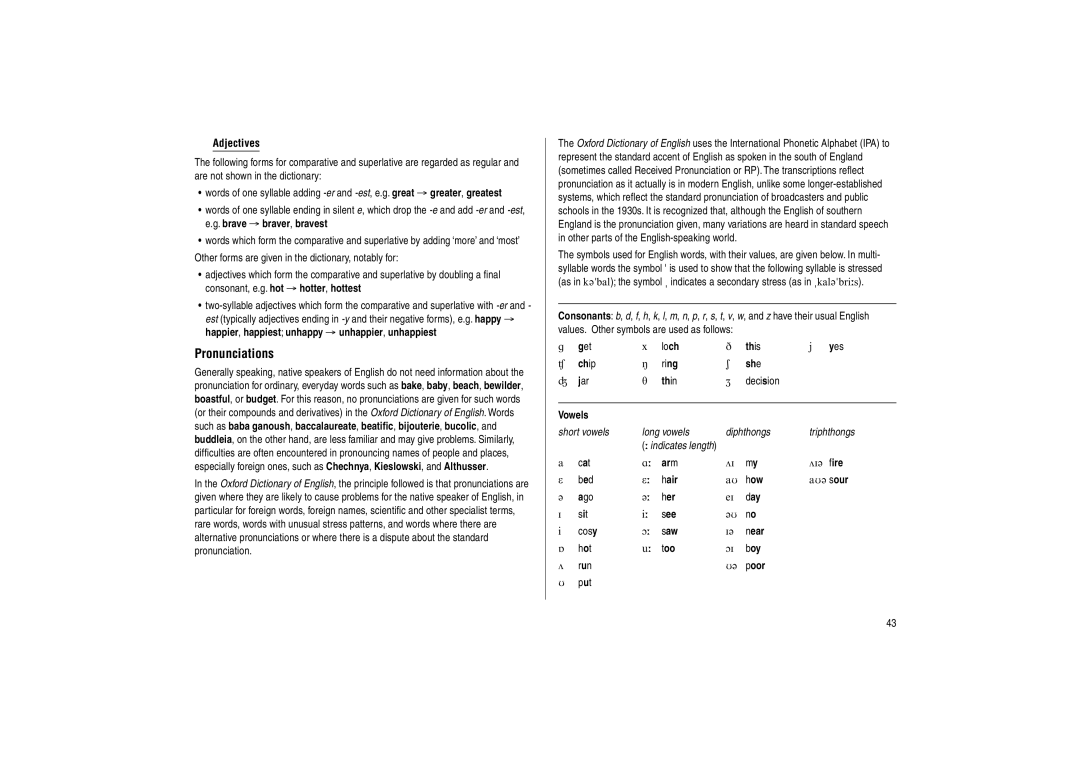
Adjectives
The following forms for comparative and superlative are regarded as regular and are not shown in the dictionary:
•words of one syllable adding
•words of one syllable ending in silent e, which drop the
•words which form the comparative and superlative by adding ‘more’ and ‘most’ Other forms are given in the dictionary, notably for:
•adjectives which form the comparative and superlative by doubling a final consonant, e.g. hot → hotter, hottest
•
Pronunciations
Generally speaking, native speakers of English do not need information about the pronunciation for ordinary, everyday words such as bake, baby, beach, bewilder, boastful, or budget. For this reason, no pronunciations are given for such words (or their compounds and derivatives) in the Oxford Dictionary of English. Words such as baba ganoush, baccalaureate, beatific, bijouterie, bucolic, and buddleia, on the other hand, are less familiar and may give problems. Similarly, difficulties are often encountered in pronouncing names of people and places, especially foreign ones, such as Chechnya, Kieslowski, and Althusser.
In the Oxford Dictionary of English, the principle followed is that pronunciations are given where they are likely to cause problems for the native speaker of English, in particular for foreign words, foreign names, scientific and other specialist terms, rare words, words with unusual stress patterns, and words where there are alternative pronunciations or where there is a dispute about the standard pronunciation.
The Oxford Dictionary of English uses the International Phonetic Alphabet (IPA) to represent the standard accent of English as spoken in the south of England (sometimes called Received Pronunciation or RP). The transcriptions reflect pronunciation as it actually is in modern English, unlike some
The symbols used for English words, with their values, are given below. In multi- syllable words the symbol ' is used to show that the following syllable is stressed (as in k@"bal); the symbol % indicates a secondary stress (as in %kal@"bri;s).
Consonants: b, d, f, h, k, l, m, n, p, r, s, t, v, w, and z have their usual English values. Other symbols are used as follows:
g | get | x | loch | D | this | j | yes |
Í | chip | N | ring | S | she |
|
|
Ù | jar | T | thin | Z | decision |
|
|
|
|
|
|
|
|
| |
Vowels |
|
|
|
|
|
| |
short vowels | long vowels | diphthongs | triphthongs | ||||
|
| (; indicates length) |
|
|
|
| |
a | cat | A; | arm | VI | my | VI@ | fire |
E | bed | E; | hair | aU | how | aU@ sour | |
@ | ago | @; | her | eI | day |
|
|
I | sit | i; | see | @U | no |
|
|
i | cosy | O; | saw | I@ | near |
|
|
Q | hot | u; | too | OI | boy |
|
|
V | run |
|
| U@ | poor |
|
|
Uput
43
